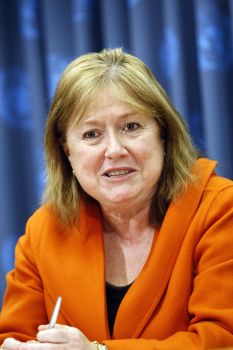Has U.N. lost its peacekeeping mandate?
CLICK HERE TO READ THIS ON CNN's GLOBAL PUBLIC SQUARE
Now that Kofi Annan has stepped down from his position as U.N. Arab League Envoy to Syria and peacekeeping troops are being removed from the country one has to wonder – does the United Nations have any role to play in conflict resolution?
The reality is that the Annan Plan, which supported an interim government to shepherd Syria into a post-dictatorship future, was doomed from the start. Bashar al-Assad was to unilaterally step down in the middle of ongoing hostilities while his forces held the momentum against a popular uprising.
Al-Assad of course played the statesman, met with U.N. officials and allowed troops to enter Syria. No one was fooled for long. His military began an all-out assault soon after Annan’s plane took off. Helicopter gunships and fighter jets strafed cities as civilian casualties mounted. Nearly $17 million was authorized for the 150 military observers and 105 civilians. While a paltry sum considering the more than $7 billion peacekeeping budget, that money could have funded, for example, 2,400 water projects for creating wells to bring safe drinking water to over a million people in need.
Instead, United Nations’ efforts lengthened by weeks if not months a concerted move by regional powers to openly oppose Syria’s indiscriminate attacks on its citizenry. The General Assembly then voted to censure its own Security Council for failing to do more.
The absurdity of the U.N. divided against itself is compounded by the poor track record of stopping violence. Despite the main charter of the U.N. beginning with lofty ideals to “take effective collective measures for the prevention and removal of threats to the peace, and for the suppression of acts of aggression…” the supra-national force has never been a realistic fighting military. It lacks the command, control, intelligence and weaponry to stop war once it has begun.
With the world economy tilting dangerously towards stagnation, U.N. budgets will inevitably be forced to shrink. The world body would therefore be well advised to focus on its humanitarian strengths and less on the intractable, hard-scrabble world of armed conflict.
This isn’t the first time that poorly conceived efforts failed to turn aggression into peaceful resolution. In the 1990’s, U.N. forces were withdrawn in the face of overwhelming evidence of Rwandan genocidal atrocities. In Kosovo, it took then President Bill Clinton committing U.S. forces to protect a Muslim minority from being massacred by their neighbors.
These days, violence still flares in the Democratic Republic of the Congo despite a U.N. presence dating back to July 2010 that now numbers over 23,000 personnel (including 19,000 in uniform) and a budget of $1.4 billion. To keep the peace in Darfur, Sudan (17,000 military) and newly created South Sudan (over 5,500) the U.N. is spending nearly $2.5 billion. And with all those forces in place, tens of thousands still flee fighting as the humanitarian situation continues to worsen. Doctors Without Borders highlighted in an August report the ongoing health crisis in Batil Camp, South Sudan with diarrhea causing 90 percent of deaths and malnourishment rates in those under two years-old hitting 44 percent. Of all the tragedies of war, these are imminently solvable problems, and yet too many continue to die because of misallocated priorities and resources.
Security Council resolutions, sanctions and other tools of the diplomatic trade do very little to change the on-the-ground reality of war. Arms continue flowing across porous borders despite calls for embargoes. While world leaders make grand speeches defending their non-intervention or the inalienable rights of humanity in the green marbled U.N. headquarters, countries continue to act with or without U.N. sanction. Spending on “political affairs” and “overall policymaking, direction and coordination” accounts for nearly 40 percent of the United Nations’ current $5.1 billion operating budget. Peacekeeping operations total another $7 billion for 2012-2013.
Yet where the United Nations excels, in disaster relief, health initiatives, education, and support for refugees, programs remain woefully underfunded often requiring public appeals with Hollywood A-listers to bolster their sagging budgets. Few would argue against feeding a malnourished child on the verge of starvation with Angelina Jolie passing out the collections tin. Many would argue for weeks and at considerable expense, mincing words in watered-down, grand sounding political statements on the inherent value of peace.
Certainly, peacekeeping has done some good, but the disproportionate amount spent on these efforts, with such poor results overall and over such a long period of time, need re-examination. A U.N. force has maintained a presence in the Western Sahara since 1994 and has been “stabilizing” Haiti for the past 8 years, costing hundreds of millions of dollars.
It is incumbent on major donors like the U.S., Japan and the U.K., which collectively fund nearly half of annual peacekeeping efforts, to weigh in heavily on reform. Direct the limited amount of resources to programs that make a difference and stop relying on antiquated dreams of stateless noble actors bequeathing peace from above. Build on peace from the ground up instead.
Brian P. Klein is a freelance writer and macroeconomic/geopolitical strategist.
CLICK HERE TO READ THIS ON CNN's GLOBAL PUBLIC SQUARE




















































